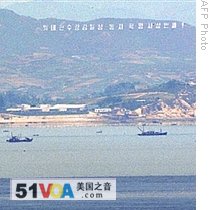Seoul
27 May 2009
 |
| A border area on North Korea's west coast, as observed from South Korea's Yeonpyeong Island in disputed waters in the Yellow Sea, 27 May 2009 |
North Korean military representatives warned South Korea, Wednesday, its decision to join an American-led security arrangement is being seen as a "declaration of war."
The statement, delivered by North Korean military representatives in the demilitarized zone separating the two Koreas, was read on North Korean television.
An announcer says any attempts to interfere with North Korea's peaceful shipping will trigger strong military countermeasures.
Seoul announced Tuesday it will fully join the Proliferation Security Initiative (PSI) a day after North Korea conducted its second test of a nuclear weapon. More than 90 nations have joined the voluntary cooperative, which coordinates international intelligence and naval activity, to disrupt the transport of weapons of mass destruction.
Technically, North and South Korea remain in a state of war. A 1953 armistice halted fighting three years after the North invaded the South, but no peace treaty was ever signed. Pyongyang warned Wednesday, it is ready to disregard the armistice, in the current environment.
The announcer says U.S. and South Korean actions to enforce PSI would present such a grave challenge to the armistice, that North Korea would no longer be bound to it, either.
Wednesday's statement says North Korea cannot guarantee the safety of ships in a sea zone west of the peninsula, where the North has never accepted a maritime border drawn by the United Nations.
Professor Yang Moo-jin, of Seoul's Kyungam University Graduate School of North Korean Studies, says the statement increases the danger of "physical" steps by the North.
He says an exchange of fire could happen "at any time" in the Korean peninsula's West Sea, if South Korea deploys vessels there.
North Korea is vastly outmatched by the United States and South Korea, in terms of military technology and logistics. Baek Seung-joo, of the Korea Institute for Defense Analyses in Seoul, says North Korea is likely to be very careful about using force. He also believes North Korea is overreacting on the PSI issue.
Baek says nowhere in the PSI charter is North Korea mentioned specifically - he says it is just a general agreement to prevent weapons trafficking. Baek says PSI does not violate any treaties or other international agreement, because it does not single out individual countries.
North Korea's recent actions are certain to be high on the agenda next month, when South Korean President Lee Myung-bak meets in Washington with President Obama. President Lee praised the "maturity" of the South Korean public Wednesday - noting that North Korea's threats have had almost no effect on financial markets.